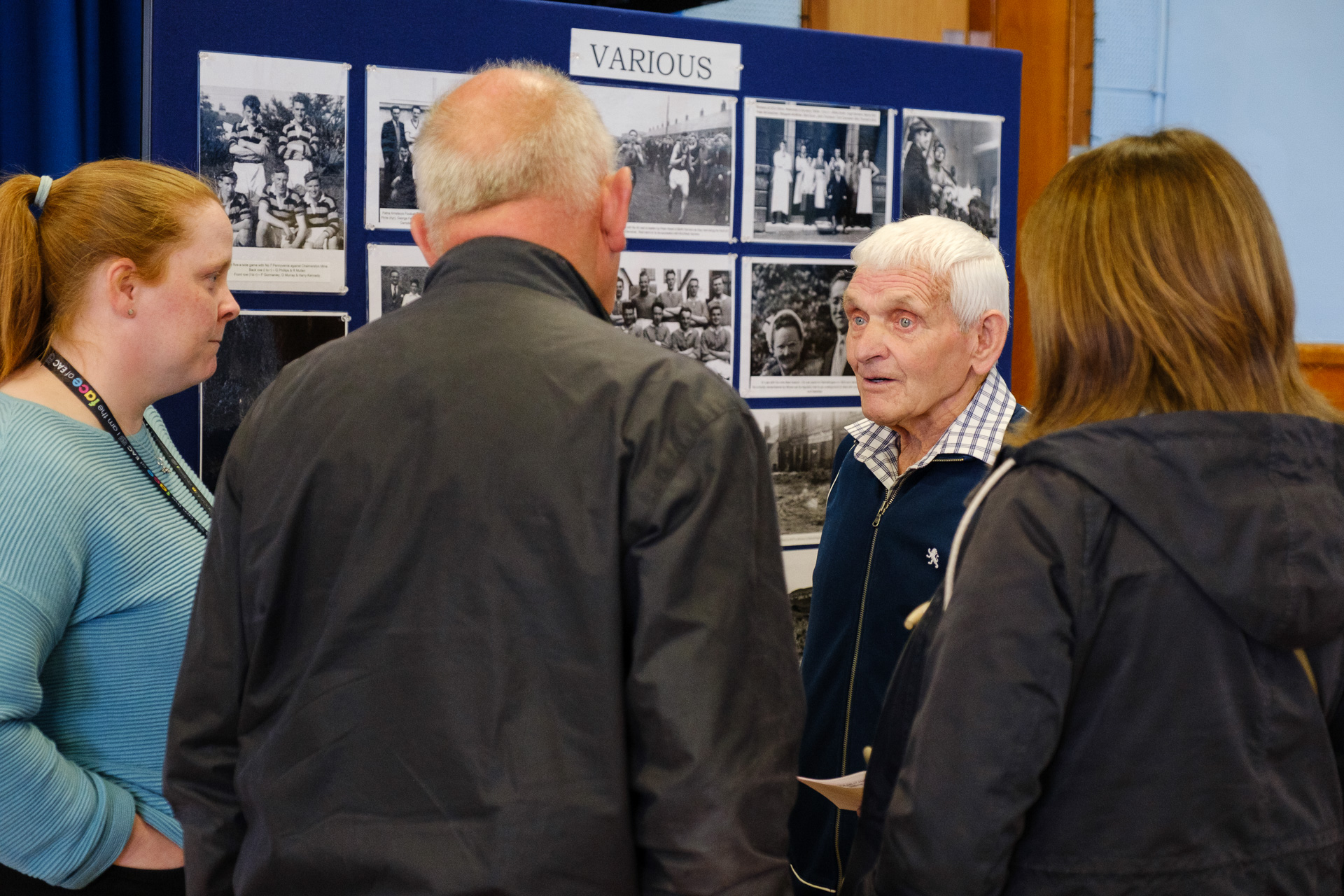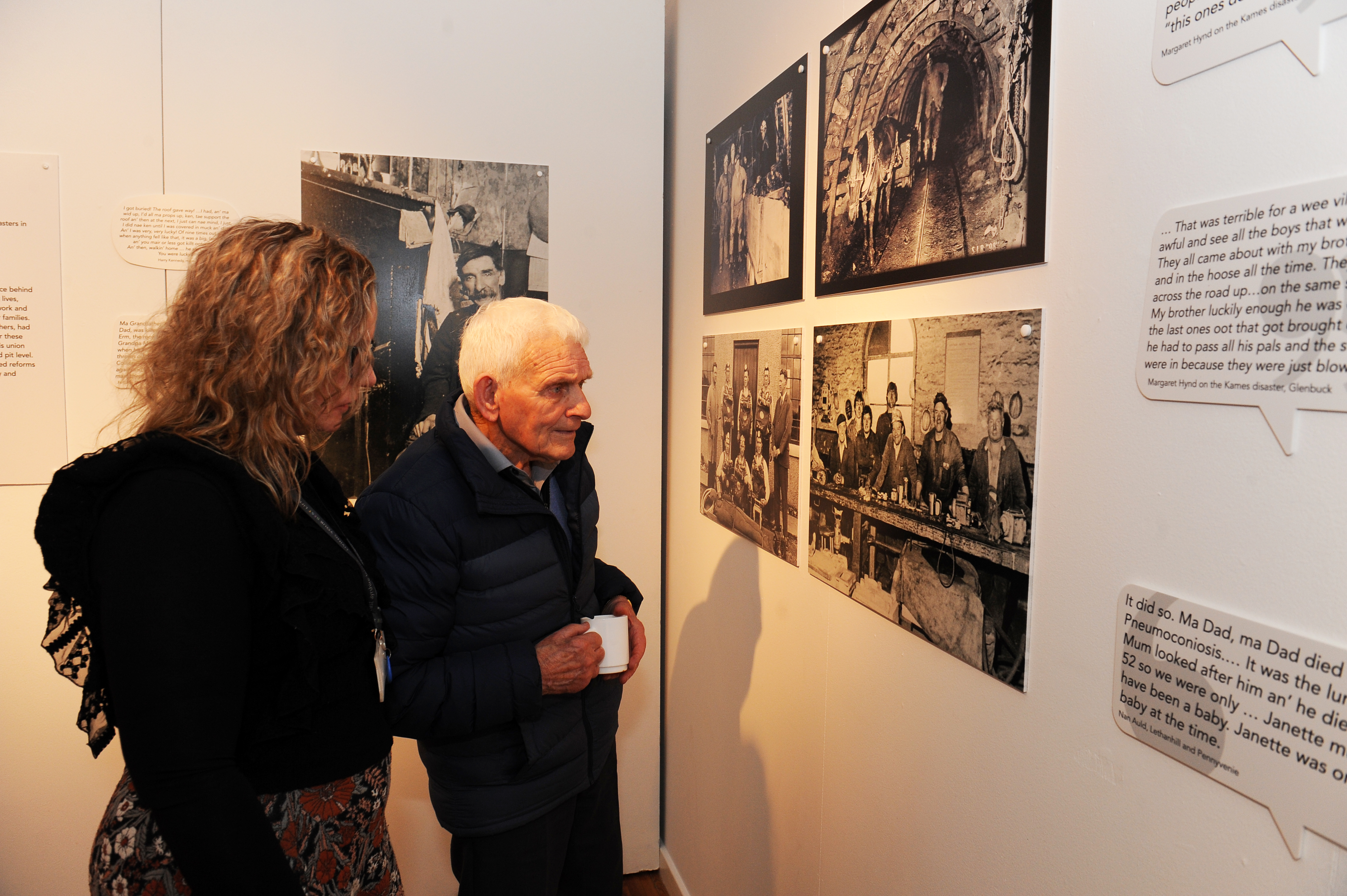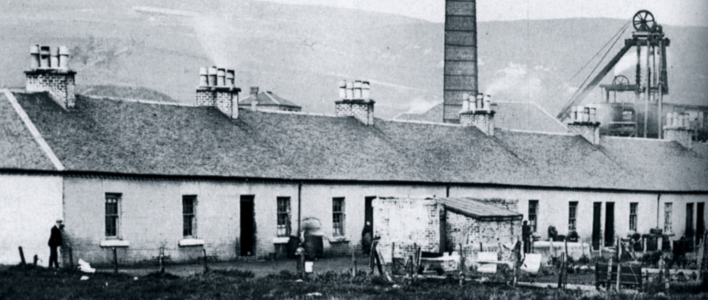Harry was born in 1932 in the village of Burnton just above Dalmellington. He left school at 14 years old to start working as a miner in 1946. He spent much of his working life in the Pennyvenie Pit but also spent time working in the Killoch, Barony and Waterside collieries before her retired in 1985. He spoke of his memories of working as a coal miner and in particular and the health dangers of the job as well as the closure of mines benefitting the health of miners and extending their life.

Photo by Peter Gordon, EAC
Health and Safety
Harry remembers the impact of dust from the mines on his fellow miners.
TRANSCRIPT:
An’ what folk did nae understand, there were all these silicosis, pneumoconiosis, nasty, men that worked beside me, big, strong men and in later years, they had nae a gasp! I’ll tell you what, I’ll tell you what I done. One o’ the times [Pause], the coal-cutters worked on the face while we were there an’ you could nae see fer stoor, the dust! An’ I was choking! I says, “Oh no, I’m, I’ve had enough o’ this!” An’ the next, the next day I got a tinker’s scarf! You know, the big tinker’s scarf?! An’ I put it roond there an’ I worked like that an’ they all laughed at me an’ I can assure you – that’s hoo I’m here!! As I say, there were that many o’ them died wi’ silicosis, pneumoconiosis an’ it was terrible watching them, you ken, they had nae a gasp!! I don’t think, that’s, that’s aboot the worst thing you can get!
Harry was involved in two serious accidents in the pits. Here he remembers when he buried alive.
TRANSCRIPT:
An’ then another time, I actually, I got buried! The roof gave way! [Chuckles] Don’t ask me what happened, I don’t know! I had, an’ ma wid up, I’d all ma props up, ken, tae support the roof an’ then at the next, I just can nae mind, I just, I did nae ken until I was covered in muck an’ dirt! An’ I was very, very lucky! Of nine times out of ten, when anything fell like that, it was a big, large stone an’ you mair or less got killt ootright! But it was all mud an’ water! Come o’er me. I might, I was covered in it an’ I’m trying t’ get oot an’ the fella next tae me, Willie Murphy (he stayed in Burnton tae), Willie Murphy you cried him, an’ Willie thought that, he says, I thought you had had it! He says, “I mind seeing yer, yer heid comin’ up through the mud, the dirt an’ that!” An’ then, walkin’ home the, doon the length o’ Burnton that night, he says, “By Jings! You were lucky!!” So, so, so I was, but…there, och, there were a lot o’ folk wi’…injuries an’ that! Some o’ them fatal an’ different things.
Working with the Men
Harry worked in Pennyvennie mine and fondly remembered the comradely and characters he worked with.
Transcript:
Pennyvenie, I knew everybody that was in it! An’ we’d some laughs, you ken. In those, it was comedians! Everybody had, you’d that many different kind of folk an’ na, different natures an’ it was really a great pit t’ work in! We were all, you knew everybody in it! An’ you [Chuckles] [Pause] You’d mebbe be, when you come up frae the pit, as I say, you just put a towel roond aboot you an’ went into the shower an’ somebody would say t’ you, “Harry, will you wash ma back?” Well, as I say, the fella that worked on the coalface, they were, like, black lead so they always had tae get somebody tae wash their back, but you’d step oot an’ somebody would hae a hose at you! [Laughs along with AM] But the, no, they were a great bunch o’ men! I [Pause], oh…I get emotional when I’m talking aboot some o’ them. They’re great! We went t’ the, t’ the Barony and the Killoch. They were different pits over there. The likes o’ Pennyvenie, there was mebbe aboot, roughly mebbe aboot, say, three hundred men an’ that was fer the three shifts. You more or less knew everybody! You went t’ the Killoch, ken, an’ they’re ta’in people all over the place! Never knew ‘em! Did nae like the Bar, the Barony was nae too bad. Did nae like the Killoch.
A Childhood in Burnton
Harry fondly remembered growing up in Burnton, a small village built in the early twentieth century that is still there today above Dalmellington.
Transcript:
I was never aff they hills! An’, er, as I said tae yer, we’re up the gl, there’s about four different glens up there an’ we went up t’ glen an’, oh, we used t’ get wur girds an’ away up the hill! You, you know what I’m talking aboot the gird?
An’, er, played a lot o’ football in the fields out there. At the back, what we called the back field, that was behind the houses, like, an’, och, every night you’d about fifteen aside! An’ I’m talking aboot schoolboys up tae aboot near about forty or fifty!! That was, it was just [Pause], it was just like a big, happy family, Burnton, so it is! I mean, you knew every, well, eh, I think it was ninety hoos, houses an’ I could tell you, I could almost tell you everybody that stayed in it, like! You knew everybody! You used tae gin next door t’ Mrs Poole’s or, you got a pancake an’ then Mrs Murphy, you got a scone! It was, they just treated you just like their own, like their own sons, like. It was all [Pause], as I say, it was like a, it was like a happy, a big, happy family!

